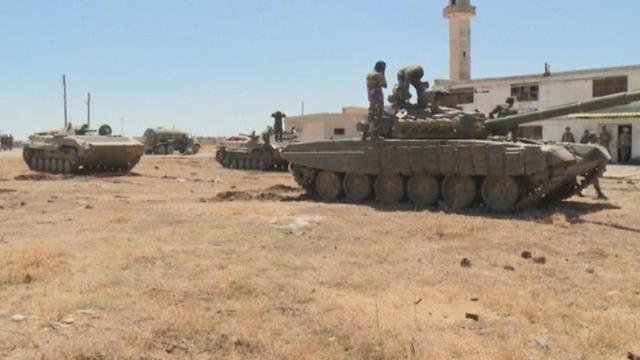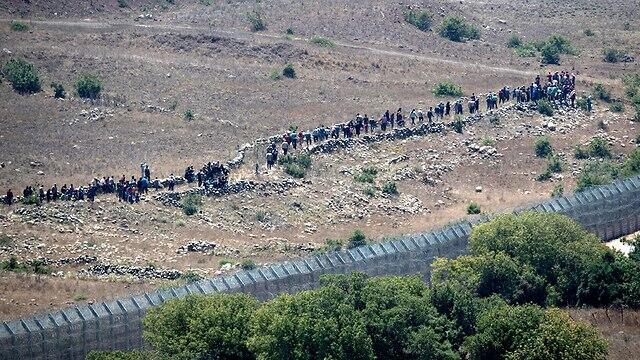Getting your Trinity Audio player ready...
Syrian President Bashar Assad is set Thursday to recover control of the frontier with the Israeli Golan Heights after rebel fighters in the area agreed to surrender terms, sources on both sides said on Thursday.
The rebels in the Quneitra province at the border with the Israel have agreed either to accept safe passage to the rebel-held province of Idlib in the northwest or to remain in the area on the state's terms, according to details outlined by a Hezbollah-run news outlet and a rebel source.
Assad's army in al-Quneitra
(צילום: רויטרס)
The emptying-out of villages of Foua and Kfarya under a deal negotiated between government forces and the rebels over the past few months marks one of the largest population transfers in Syria's civil war.
In exchange, the Syrian government is expected to release a number of detained insurgents.
Over 7,000 people from two Syrian pro-government villages in the country's northwest that were besieged by the rebels for three years have been evacuated, Syria's state-run media reported Thursday.
Lebanon's Hezbollah terror group fights in Syria in support of Assad.
It would mark another major victory for Assad, who has recovered swathes of southwestern Syria over the last month in a Russian-backed offensive that has already forced many rebels to surrender.
In exchange, the Syrian government is expected to release a number of detained insurgents.
Provisions of the surrender agreement were distributed to the rebels and obtained by Ynet:
1. Ceasefire will commence immediately and unconditionally at 7pm and with no time limit.
2. Rebels who want to remain in the Quneitra province will receive pardon. Persecution of rebel soldiers ,officers and deserted citizens will cease and they will not face trial.
3. The rebels' heavy weapons will be handed over within the time period determined in the near future.
4. Residents immigrating from Damascus's outskirts will return to their homes.
5. The army's Brigades 90 and 61 as well as the Russian police will return to the ceasefire line and the demilitarized zone, according to the 1974 agreement.
6. The coordinated entry of the forces will be from the south and north.
7. Those opposing the agreement have the option to move to Idlib.
8. A committee monitoring the issue of detainees will be established
9. Freedom of speech is guaranteed according to law.
10. The Russian police will enter the UN post.
11. An agreement will be reached at a later date with Russia to determine how to hand over control over al-Jabiya to prevent its falling into ISIS hands.
The provisions did not elaborate on the implications of the deployment of military units in the zone.
The evacuation of the villages was used as a negotiating chip in earlier population transfers along conflict lines. The United Nations was not part of the negotiations and has criticized such transfers as forced displacement.
An agreement to evacuate Foua and Kfarya last year halted after a car bombing killed over 100 people at a parking lot for buses meant to bring the evacuees out.
Shortly after leaving, more than 19 buses carrying the villagers Thursday arrived at the al-Eiss crossing in the countryside of Aleppo, while more than 51 buses arrived at a makeshift center for displaced people in Jibreen, Al-Ikhbariya said.
The buses had traveled through rebel-held territory to arrive there.
Evacuation deals and population transfers have become a norm in the seven-year Syrian conflict which has seen tens of thousands of rebels and civilians transported from rebel-held areas to the northern province of Idlib and surrounding opposition-held territory amid advances by President Assad's forces.
US President Donald Trump said at a news conference with Russian President Vladimir Putin on Monday in Helsinki that both had agreed to work together to help ensure Israel's security.
Putin, Assad's most powerful ally, cited the need to restore the situation along the Golan borders to the state that prevailed before the outbreak of the Syrian crisis in 2011.






